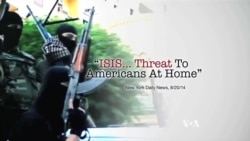While terrorist beheadings, the Ebola epidemic and immigration were on the minds of many Americans this year, the way they were covered by U.S. media and hyped in campaign ads prompted commentators to wonder whether the country has been overcome by fear.
"It is especially disturbing, that a nation like the United States, which is unprecedented in its power, unprecedented in its resources, can live in such a fearful state," said Rev. Gene Robinson, a retired Episcopal bishop who is now a fellow at the Center for American Progress.
In a column he writes regularly for The Daily Beast online magazine, he decried the “pandemic of fear” that preceded the midterm elections in November.
Political candidates often play up public fears to get elected, and this year attack ads showed Ebola workers in hazmat suits, immigrants attempting to cross the Mexican frontier under the cover of darkness and the beheadings of journalists and humanitarians by Islamic militants in the Middle East.
"Evil forces around the world want to harm Americans every day," an ominous voice began one ad in a congressional race in the border state of Arizona.
Deseret News of Salt Lake City, Utah, suggested that media coverage had made Americans overly afraid.
It cited a poll by the Public Religion Research Institute which found that one-third of respondents were "very concerned" or "somewhat concerned" that they or someone in their family could be harmed by terrorists.
"The likelihood of being a victim of a terrorist attack is fairly slim, statistically speaking," PRRI researcher Daniel Cox was quoted as saying. "But that doesn't mean that fear is any less palpable."
The response to the Ebola scare was a topic of conversation at the annual meeting of the American Anthropological Association, held in Washington, DC in early December.
Doug Henry, a medical anthropologist at the University of North Texas, said the quarantines imposed on aid workers returning from helping Ebola patients in Africa, “weren’t exactly governed by science.”
By contrast, he said, fear has been harnessed as a positive force in public health in campaigns against smoking and distracted driving.
"What we have seen from this epidemic is that if you have just fear, and just fear messaging, in the absence of any self-efficacy messaging - in other words, messaging that shows people how to handle a response - it can actually have maladaptive social behaviors - driving the epidemic underground, mass panic, hysteria."
Fear has played a role before in American politics. In his 1933 inaugural address, President Franklin D. Roosevelt famously declared:
"The only thing we have to fear is fear itself!"
But media observers said the hyperintensive, self-reinforcing style of coverage common today on news shows was having a magnifying effect.
"Have you been paying attention to the news lately?” comedian Jon Stewart, who skewers American media coverage in his Daily Show, asked in October.
“You might have heard: we are all going to die!"
Gregory Button, a disaster researcher at the University of Tennessee, Knoxville, who was also at the anthropological conference, sees no evidence that Americans were any more concerned about these threats than in previous years.
“There’s always a level of uncertainty and fear in any culture,” he said. “It’s a constant that we live with on an everyday level.”
A former journalist, Button says the threats are “a cultural construct.” He points out that number of deaths they have caused in the United States is dwarfed by traffic accidents, which kill more Americans every two years than died in the entire Vietnam War.
"Cultures selectively choose which social problems they are going to focus on,” he said, adding: “Sometimes it seems irrational."







